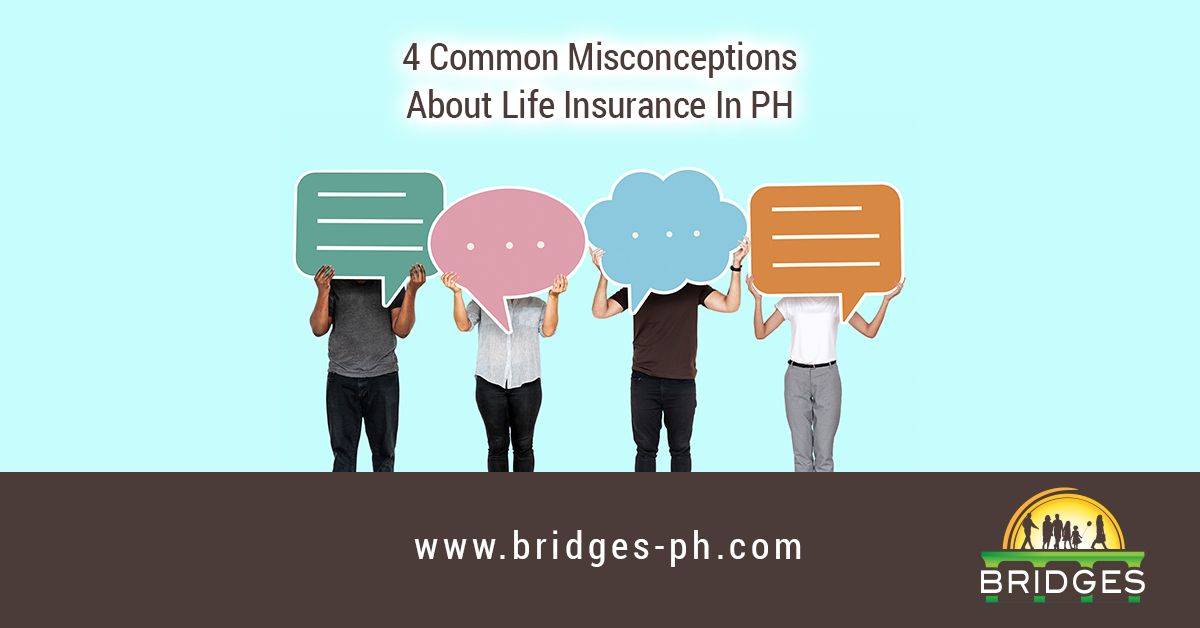
Do you find life insurance confusing and complicated? Well, you’re not alone. From the sheer number of options available to the different riders that come with each one of them, anyone outside the world of finance will likely have a tough time understanding the technicalities of their policy unless they receive some form of professional help. Some people might even be guilty of buying policies without thoroughly reading through the fine print.
Of course, you’re not expected to know every last detail printed on your policy, but you have to at least know the basics of what it entails. Not doing so can give you misconceptions about your life insurance coverage, which can in turn make it harder for you to get the most out of it.
Here are some common misconceptions about life insurance in the Philippines:
Not an investment tool
Whether you’re shopping for a policy or already have one, it should be clear to you that life insurance is not an investment tool.
What do I mean by this?
Life insurance policies should be bought for the purpose of risk management and security, not to expand your income. It cannot be overstated enough that certain policies only have the potential of growth and not a guarantee. Even if you do eventually earn dividends or fund values, it won’t be much compared to what you might earn from, say, mutual funds or stocks. As such, the dividends or fund values from life insurance are only added income.
Different options
One pitfall of those in the market for life insurance but don’t know much about it is that they’re coaxed into buying more expensive policies that they may not necessarily need. Lesser experienced insurance advisors might push potential buyers towards these policies since they have more gain from making the sale.
This is not to say that you ought to dismiss anyone who comes to you with an offer. What’s important to know is that you have options and always ask whoever is presenting you the policy to lay all the cards on the table. There are different types of life insurance plans available in the country, from variable universal life to term life, among many others. Which one works for you ultimately depends on your objective in the future.
Take for instance, if you don’t necessarily have the budget now for a whole life plan and you’re far from having children yet, you may be able to stay secured with just a term life plan.
Remember, you have options and you don’t have to commit to the first one that you stumble upon. Find what’s right for your personal needs and budget. Consult with a professional if you have to.
Living benefits
It’s easy to think that life insurance only benefits your heirs after your death. That, however, is not true as, depending on your insurance policy, you may be able to claim some benefits while you’re still alive, called living benefits.
For example, whole life and endowment plans have dividend and endowment payouts which are accumulated over time. These payouts can be withdrawn from the policy. They can also be used to purchase additional paid-up insurance or used to pay for the succeeding premium dues.
Whole life and endowment plans let you take out a loan as well in case you suddenly need money. The advantage of loaning through your insurance policy versus that of the bank is that you don’t have to go through a credit check anymore. In some cases, the interest charged to you might also be lower than that of other lenders.
There are also situations where you can withdraw cash if certain conditions of riders are met, such as contracting a terminal illness or becoming disabled, to name a couple. Having these riders in your policy typically costs more, but they’re there to add protection and make your policy a bit more flexible.
Employment insurance is rarely enough
Don’t make the mistake of thinking that you’ll be fine with just the life insurance offered in your job. While it’s good that your employer or company is providing you with something, it alone won’t cut it in covering the expenses of your dependents in the worst case scenario that you pass away.
It’s also worth pointing out that whatever benefit you’re enjoying in your current job, those won’t follow you when you leave or retire.
As such, it’s essential that you supplement your employment life insurance with one that you purchase on your own, preferably one that has more value and benefits. This is the best way you can secure your family’s future without having to rely on someone else.
Regardless of your age or status in life, the importance of having life insurance coverage cannot be understated. And now that you hopefully have a better understanding of what it is and what it can do for you, you can take appropriate action to protect yourself, your finances, and your family from life’s risks.
linkiNG you to opportunities,

READ MORE:
- Securing The Lifestyle You Want For Your Future
- Life Insurance: Preparing for the Inevitable
- Getting Good Value: How To Make Premiums More Affordable
- Staying One Step Ahead of Disabilities That Can Put You Out of Action
- How You Can Secure Your Family’s Future From Life’s Uncertainties
- Workplace Stress: The Struggles of Working During A Pandemic
- Providing Healthcare Programs For Your Employees Amid The COVID-19 Pandemic
- Perks of Investing At An Early Age


